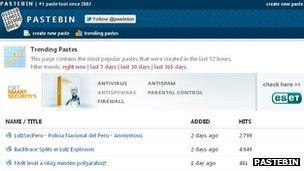Pastebin to hire staff to tackle hackers' 'sensitive' posts
- Published

Pastebin's trending list typically includes several articles posted by, or about hackers
The owner of Pastebin.com says he plans to hire more staff to help police "sensitive information" posted to the site.
The website is frequently used by Anonymous and other hackers to reveal data taken from their targets.
In the past this has included home addresses, email passwords and bank account details.
Pastebin currently relies on an abuse report system to alert it to material that might need to be removed.
Jeroen Vader, a 28 year-old Dutch entrepreneur, bought the site from its original owner in early 2010.
In that time he says he has helped grow its popularity, as it now attracts an average of 17 million unique visitors a month. The site makes money from banner adverts on its pages.
Revelations
Many visitors to the site use it to keep watch over trending topics. These often include articles posted by people who identify themselves as being linked to the hacktivist collective Anonymous, or related movements such as Antisec or Lulzsec.
Recent posts have included details of attacks on Panda Labs, the Spanish security firm; Stratfor, the US risk analysis firm; and email addresses and passwords belonging to users of the Youporn pornography sites.
In January, users who discovered that feeds from thousands of Trendnet home security cameras could be accessed to spy on their owners posted details of the internet addresses and locations of some of the breached devices on its site.
Pastebin asks its members not to post password lists, source code or personal information.
Mr Vader said he currently received on average a total of 1,200 abuse reports a day via Pastebin's on-site notification system and by email.
"I am looking to hire some extra people soon to monitor more of the website content, not just the items reported," he told the BBC.
"Hopefully this will increase the speed in which we can remove sensitive information."
Blocked users
Mr Vader noted that personal information about himself had been posted to Pastebin, which he "quickly" removed.
He confirmed reports that the site had been blocked in Pakistan and Turkey after material hacked from local databases was published.
However, he said that people in both countries were still finding ways to visit the site, and traffic from the two nations had only fallen by about 50%.
Mr Vader also noted that Pastebin itself is the victim of unidentified hackers.
"In the last three months not a single day has gone by that we didn't get some kind of DDOS [distributed denial of service] attack," he said.
"I do hear from people in the hackers community that many hackers like to test their DDOS skills on Pastebin."
- Published2 April 2012
- Published8 March 2012
- Published8 March 2012
- Published26 December 2011